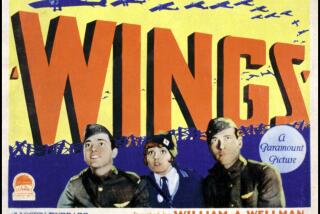Oscar hopefuls face the dilemma of dual roles
Comb the list of actors contending for an Oscar this year, and you might think you’re seeing double.
Award season sometimes brings the occasional star with a pair of movies in the running, but this year no fewer than a half-dozen performers could find their biggest rival staring at them in the mirror.
The list of acting award hopefuls with multiple movies is long and diverse: Brad Pitt, Carey Mulligan, Viola Davis, Ryan Gosling, Jessica Chastain, Michael Fassbender and George Clooney, who, with his turn as a grieving father in the low-key drama “The Descendants,” will try to win his first lead actor Oscar even as he’s pushing “The Ides of March,” the political drama he directed, produced, co-wrote and costars in.
“I always feel like I’m competing against myself,” Clooney told The Times. “Every morning I feel like I’m competing against myself.”
The actor might have been joking, but as the race heats up for the February awards, Clooney and the others are caught up in the knotty issues that come with seeking attention and accolades — not to mention ticket sales — for two films. Those challenges include deciding which movie to favor on the campaign trail and the possibility that attention for one film will undermine the other.
The trend is a symptom, experts say, of a film industry culture in which only a small handful of stars can get a movie off the ground, as studios and financiers become more conservative about casting.
“It’s just incredibly risky to open yourself up to a newcomer,” said Avy Kaufman, a leading casting director who has worked on movies as diverse as the challenging low-budget drama “Shame,” starring Fassbender, and big studio action franchise films including “The Bourne Ultimatum.” “Even independent films want names these days, and there just aren’t many that [financiers] will accept. So moviegoers see the same people again and again.”
Clooney is perhaps the biggest of those names, and, despite the high-class nature of the problem, it could add a few more gray hairs to his salt-and-pepper coif.
In “The Ides of March,” about the forces out to bring down an idealistic presidential contender (Clooney), the actor makes a timely comment about the contemporary political process. Oscar voters might want to nominate him in any one of the categories in which he’s eligible, including supporting actor. But in doing so, they might decide not to vote for him a second time in “The Descendants,” depriving the A-lister of a shot at a lead actor trophy.
“I don’t think you ever really see an actor get shut out when they have two movies,” said veteran award consultant Cynthia Swartz. “But you do see one movie get chosen over the other.”
In 2006, Leonardo DiCaprio appeared likely to be nominated for his role as a cop working undercover in the mob in “The Departed,” the Martin Scorsese-directed blockbuster that went on to win best picture. But he was overlooked for his work in that film and instead shortlisted in the lead actor category for his part in the Africa-set drama “Blood Diamond,” a movie that drew a more mixed critical and commercial response. This year Pitt could find himself in a similar situation. He’s campaigning in the supporting actor category for his performance as a stern 1950s father in “The Tree of Life” and in the lead actor category for his role as a wisecracking baseball executive in “Moneyball.”
A trio of actresses this year could find themselves in a similar position.
Davis is a front-runner for a lead actress Oscar nomination for her turn as a steely maid in the race drama “The Help.” But that performance could siphon off support from her supporting role in “Extremely Loud and Incredibly Close,” a Sept. 11-themed award hopeful that comes out just before Christmas and has not yet screened for tastemakers.
Chastain, Davis’ “The Help” costar, is in the running for her roles in two other films besides the civil-rights tale — “The Tree of Life” and the supernatural drama “Take Shelter.”
Mulligan, meanwhile, has been drawing interest for her supporting turn in the dark heist movie “Drive.” But she could have those hopes offset by interest in her supporting turn as a drifter chanteuse in the sex drama “Shame,” out Dec. 2.
The situation is most fraught, say experts, when contenders have a pair of lead performances, as the Academy of Motion Picture Arts and Sciences does not allow an actor or actress to be nominated twice in a given category. That means that, this year, the actors branch members who fill out their nomination ballots for lead actor will be forced to choose between
Gosling’s turn as a strong, silent type in “Drive” and as a conflicted campaign manager in “Ides.” Likewise, Fassbender, who is generating heat for his lead role as Carl Jung in the period psychoanalytic drama “A Dangerous Method,” which comes out Nov. 23, and for his role as a sex addict in “Shame,” can only be nominated for one of them.
Filmmakers can sometimes find themselves in this position too — the directors Steven Spielberg and Werner Herzog, for instance, each bring out two contenders this year. But the dual-role problem especially affects actors, whose presence on the award circuit is most critical.
In a time when seasonal events — screenings, interviews and panels — have multiplied exponentially, equal promotion for each is simply impossible. Fassbender, for instance, has decided to bypass some of the Los Angeles media for “Dangerous Method” and instead will focus more heavily here on “Shame.”
“Sometimes it’s a matter of which movie an actor feels stronger about,” said one well-known award consultant who requested anonymity because of the sensitive nature of client relationships. “And sometimes it comes down to whether they want to go for the prettier girl [lead actor] or for the sure thing [supporting actor].”
Still, even an actor’s most carefully plotted efforts don’t always succeed.
In 2008, Kate Winslet tried to avoid competing against herself by campaigning for her role in the Holocaust drama “The Reader” as a supporting part, hoping to clear the way for a lead actress nomination for her turn as an unhappy housewife in “Revolutionary Road.”
But the academy ignored her call, awarding her the lead actress Oscar for “The Reader.” It didn’t acknowledge her turn in the other film.
Amy Kaufman contributed to this report.
More to Read
The biggest entertainment stories
Get our big stories about Hollywood, film, television, music, arts, culture and more right in your inbox as soon as they publish.
You may occasionally receive promotional content from the Los Angeles Times.







